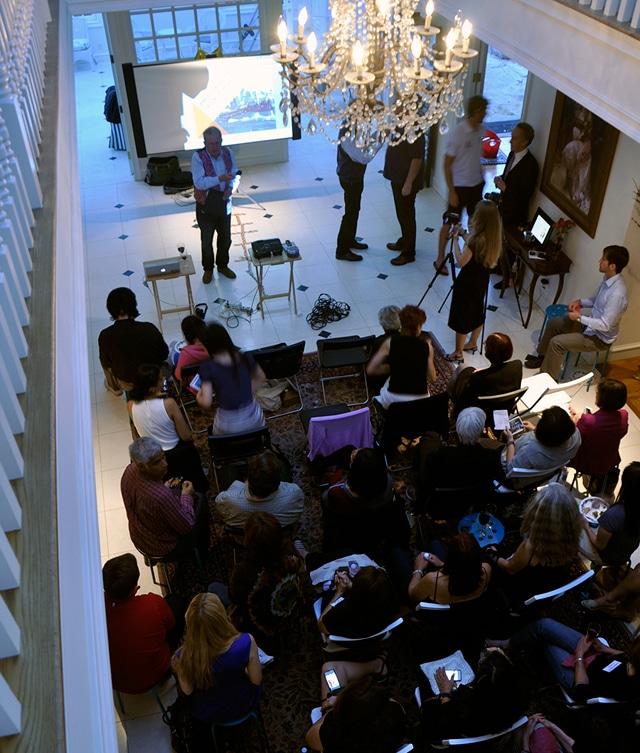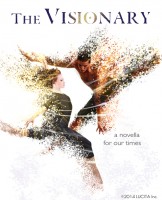Have you ever attended a writer conference? If not, what the hell are you waiting for?
If you have, did you get the most you possibly could out of it? If you did, great. I want to hear all about it in the comments. If not, you need to read this post.

Photo by Bill Daul
Several weeks ago, I attended the Algonkian Write to Market Conference, north of San Francisco. (Yep, the one I mentioned at the end of one of my blog posts, remember?) I met amazing people, made friends with wonderful fellow writers, participated in some of the best live pitch critiques you'll hear on the West Coast, and on the first evening was ceremoniously sacrificed at the altar of upmarket fiction—with two fellow authors as witnesses and a horse-size cobb salad to bury my face in.
I emerged re-born with a brand new pitch and a kick-ass title for one of my upcoming novels. A pitch that got the initial nod of interest from five out of the five literary agents I presented to.
On the drive back home, cars seemed to peel away before me, no doubt sensing the effervescing euphoria emanating from my wheels (ooh, accidental alliteration!).
Granted, that was AFTER the pop-up traffic jam at Candlestick Park, darn those sporting events. Should've stopped for a hot dog.
So why was this particular writer conference so insanely great? Let's break it down.
Do Your Homework
You don't just show up at a writer conference. You need to be PREPARED. Any writer conference that promises heaven and earth, but doesn't make you move a finger before the first day, is more likely to deliver disappointment hell.
The people at Algonkian certainly made us sweat long before we set foot in the conference room. Here is a list of what we were responsible for BEFORE Day 1:
- Read “One Flew Over a Cuckoo's Nest” and “All the King's Men.”
- Read 10+ articles about various aspects of fiction writing.
- Read the Algonkian Competitive Fiction Guide (88 pages).
- Write a simple story statement for your novel.
- Sketch out your antagonist.
- Come up with up to three killer titles for your novel.
- Become very familiar with your genre and research your comparables.
- Define the primary conflict in your narrative.
- Work out the inner conflict of your protagonist and the secondary conflicts in the narrative.
- Describe the setting of your novel in detail.
Not enough work? How about having to memorize your 1-minute pitch the night before the live pitch sessions with actual living breathing literary agents?
Point is. Before you sign up for a conference and pay their hefty fees, read through their entire site. Ask them questions. See what their conference organizers and faculty have published, who's coming to speak and give workshops, and above all, what they expect you to do before the event.
No Pain, No Writer's Gain
See above. But, since I've got the space, allow me to expound:
You don't become a great and successful writer without putting in the time. I'm not going to debate Joe's piece on the Ten-Thousand-Hour rule here, but the bottom line is, you have to put in the time. The greatest writers who ever lived, always put in the time. Whatever time that is, and however you apply it—working out your narrative arc, defining the antagonistic forces, fleshing out your protagonist's inner conflict, doing research—ya still gotta do it, ya know?? You know your strengths and weaknesses best. If you don't, you should. (Another reason to attend a writer conference!)
Not only do you have to put in time, you should also learn to embrace pain. The pain of rejection, of critique, of readers, agents, editors, and fellow writers completely misunderstanding your narrative—likely because you haven't written it effectively. Embrace it, face it, and learn how to walk through it to the other side. It isn't called “labor of love” for nothing; the analogy is very apt.
Yes, be the first to assume responsibility for flaws in your writing, be eminently grateful to those who point them out, and have the courage to listen to advice from people more experienced than you. I'll tell you a story Michael Neff, the director of the Algonkian conferences, shared with us that weekend: at one of the events Michael puts on (they do several writer conferences throughout the year), he worked with one writer whose pitch was falling to pieces. He helped the writer get his pitch to a level he knew, from his ample experience as editor and agent, would be acceptable for the agents attending the conference, and even accompanied the man to the pitch event.
To Michael's astonishment, the writer pitched the original version of his novel (yes, the one with no legs). Needless to say, the agent turned it down flat and POOF! the writer's chance at getting published by a big house was gone. When Michael inquired why in the world the writer didn't do the pitch they'd worked on together, he sheepishly confessed that at the last minute he'd called his wife who convinced him his original story was better.
Sound harsh? Maybe, but if you want to grow and learn and succeed as an author, you need a thick yet porous skin. If you want praise, call your mother (or your spouse).
Support Without Slobbering
Unless you're wealthy enough to buy your own personal writer's retreat in the Swiss Alps, you will rub shoulders and elbows (and maybe knock foreheads) with other writers. Some will be better than you, some will be not as good. Some will have sold lots of books, some will be just starting out. Whatever the case, you're all in this conference together, and the playing field has just been bombed flat by the dynamic personality of the conference director (that's a compliment in case you're wondering).
We spent the better part of two days listening to the pitches of our fellow writers, and engaging in detailed critiques of each and every one. The atmosphere sizzled with the neurons of close to 100 writers. We sliced the pitches to pieces, taking them apart on multiple levels: the literary, the narrative, the protagonist, the antagonist, the commercial market. If the story was good, it was recognized and challenged further. If it wasn't, it was discussed why—and, I must say, with a great deal of very intelligent, and very enjoyable, humor. And always with respect.
Then we'd go out for an incredibly delicious lunch, get to know each other better, and come back to do it all again in the afternoon.
I wanted those two days to go on for a month.
Supporting your fellow writers doesn't mean praise for praise's sake. It doesn't mean five-star reviews that drip off your screen. No matter how good their writing is, it can always improve—and that's why you're all there at a writer conference. To get better at your craft.
Pitch Time
By the time Pitch Day rolled around, I was ready. I'd practiced my pitch up and down, backwards and forwards, pulling fellow writers off the catwalk at the hotel for impromptu pitch sessions (You play the tough, jaded agent, I play the up-and-coming writer). I thought for sure my pitch would evaporate right out of my brain the moment I sat down at the first agent's table.
It didn't.
One after the other, the five agents nodded as I told my tale, genuinely interested. “Send me the manuscript,” they all said.
Now, I didn't attend the Write to Market conference to sign with an agent, per se. I attended because I respect Michael Neff and his tough-love approach to shepherding writers into the halls of commercial success. That's what he promised, and that's what he delivered. And that's the point of a writer conference.
What would you like to get out of your next writer conference?
PRACTICE
Pretend you're going to the next Algonkian Writer Conference. Pick one thing from the bulleted list above in the “Do Your Homework” section, starting with the FOURTH bullet, and do the exercise. For specific directions to each exercise, go to the Write to Market “Pre-Event Work” web page. Then post your work here in the comments.
p.s. Can you find me in the photo above? If you can, by golly you're good! And you'll get one of my short stories in your Inbox as recognition of your clairvoyance.







Brigitte – Bravo! Informative and inspiring. I’m off to define the conflict in my story. And afterwards to the Algonkian site for next year’s event.
Excellent! You’re going to love it. If you do end up going be sure to email me and I’ll let Michael Neff know directly.
My current working title is “Into Darkness The Prince” I have considered the following titles: 1. Inferno 2. The Shiva Gift 3. The Scorpio Effect
The main conflict within the book (this will actually be an ongoing conflict streaching through an entire series) is Evil versus Redemption.
Can my protagonist comitt the ultimate evil, the destruction of human souls, and find her way back to any semblance of humanity? She is faced with a choice, save humankind as a whole while sacrificing her own humanity vs shielding herself and her family while allowing the destruction of her own species. This seems a simple choice, and my protagonist makes what she thinks is the only decision open to her. Evil slowly consumes her. The first book in the series leaves her firmly ensconced within the evil she thought to battle.
Hi Vicki,
See the comment I just wrote to Claire above, but in brief:
Before you describe the primary conflict in your story, sketch out the antagonist (this can be a person or a force). The antagonist sketch tells you how the antagonist shapes and helps the protagonist evolve throughout the narrative. In other words, why the protagonist—and the narrative—would not be the same without the antagonist. Why without the antagonist, you wouldn’t have a story.
Your blogs are always so well written and insightful. As a writer whose first novel is about to come out in January, I always fear I have not done enough. Your tips always provide for me a great guide as to what else I can do and where else I can go. Many thanks!
Thanks so much Charles, you’re very welcome. Congratulations on your first novel! What’s it about and are you releasing it yourself or through a publisher?
Your blogs are terrific! They are generous with information and in great detail. The last conference I attended was expensive and not that helpful. When I said I wrote short stories, the instructor responded, “I’m so sorry!” That was that. I’m working on a statement to introduce a collection of my stories. Thanks for all you offer!
Wow, Ruth, how incredibly unprofessional, and arrogant to boot. Did you tell this “instructor” that this year’s Nobel Prize in Literature was awarded to a writer of short stories? http://www.nobelprize.org/nobel_prizes/literature/laureates/
I personally love short stories. You go. Get that collection out there!
Thanks Birgitte! I’m checking out the Nobel Prize in Literature. Also re the photo: is that you in the 4th row far right?
No that’s not me! Try again…? 🙂
I’ve never been to a writer’s conference and honestly after reading the prerequisites to participation I may never go! I love writing but my haphazard approach makes me feel like a kindergartner compared to the intensity with which some folk write. I wouldn’t show my face in a room with the big boys (and girls) to save my soul! Of course I fully understand that’s what it takes to be great. Perhaps my real issue is that I don’t have the expectation of greatness for myself. Hmmm, gotta chew on those thoughts for a bit.
Beck, see what I wrote to Dan above who also has not yet attended a conference. Although, in your case you have a very different reason not to go. I say, face your fear and go! Remember: you will advance in your life only as far as you dare to dream. And do the work to make that dream happen.
I would love to go to this workshop. It’s close enough that I could drive down.
I went to the Santa Barbara Writers Conference last year and focused on writing workshops. The teachers were amazing. It was fantastic and worth every penny, but one can only do so much, so I didn’t make it this year. I didn’t feel ready to pitch, in fact I’ve been afraid that I would never feel ready to make a pitch, even though I’ve done my best to define most of the above for my first novel.
Had you written your novel before going, or just have an idea? As i understand it, there should be a pretty decent draft, or at least the first twenty pages, all ready to go before talking with an agent.
That would be wonderful Ann. Also glad to hear you got a lot out of the Santa Barbara conference.
You may never “feel ready” to pitch, or to do anything else in life for that matter. Best thing to do is to JUST DO IT. Pitching isn’t going to alter your life, with the exception of giving you the experience of pitching. You have literally nothing to lose!
Thanks so much, Birgitte. It sounds like a good idea to go to a workshop where one learns how to pitch and practices doing so, with feedback.
p.s. You shouldn’t pitch with just an idea, you need to have your manuscript either finished or almost finished. Not good enough to have just the first 20 pages. Because if an agent does show interest, you don’t want too much time to go by before you send it to them. They will first ask for a first sample, and right after that the full manuscript needs to follow.
That is what I thought.
Interesting post, Birgitte and, obviously, a very intense writer’s conference. Your enthusiasm is evident from your post. I can see that the preparation for the participation assured a productive interaction with the attendees.
Anyway, since you suggested that we spot you in the picture, I think you’re sitting to the right on the fourth seat of the forth row. I believe that’s you.
Now for the challenge—Sketch out your antagonist:
The antagonist in my story is “Dirty Harriet,” good cop turned bad cop turned snitch in a maximum security women’s prison. She has become a saboteur and the biggest nightmare of another inmate—Rachel, her ex-partner from the force, who was framed for the killing of her husband by Harriet. Soon after, Harriet was found guilty of drug dealing within the force and incarcerated. Her machinations have made life behind bars very difficult for Rachel who’s trying to stay out of trouble to shorten her sentence while working to prove her innocence, but “Dirty Harriet” keeps taunting and harassing her to the point where a major fight ensued and solitary confinement was the punishment doled out—but only for Rachel, whose anger has now escalated to rage. With time on her hands to think, Rachel devises a plan, but will it jeopardize her freedom?
Hi Claire,
Thanks for doing the exercise! You need to go a little deeper however. This is fine as a surface level description, but it doesn’t give us the real forces at work. Think for example about the underlying source for your antagonist’s nature and character. What drives Harriet? What is it about her life and past that determines her decisions and her life path? Even if you don’t explicitly state this in your narrative, you need to have this clear for you as the author.
The antagonist sketch tells you how the antagonist (Harriet) shapes and helps the protagonist (Rachel) evolve throughout the narrative. In other words, why the protagonist—and the narrative—would not be the same without the antagonist. Why without the antagonist, you wouldn’t have a story.
The last sentence shouldn’t be part of your antagonist sketch, as it deals with Rachel and the story arc.
p.s. The photo: you mean the fourth row from the top? No, that’s definitely not me! 🙂
Birgitte, thanks so much for your critique. I certainly can use the guidance, and it helps me focus. I just want to understand when you suggest that I go a little deeper into the character of the antagonist if that means including in the sketch the reasons in her past why she’s on the other side of the law now. You’re absolutely right about the last sentence. After I re-read the submitted post, I realized that it didn’t add anything to the antagonist’s story arc. Thanks again for the feedback.
Regarding the picture–let me take another stab at guessing then. You’re probably the woman in the royal blue top sitting on the first seat to the left on the fourth row.
Hi Claire,
I like your tenacity in guessing which person is me! The same quality will do you well in writing. So, that’s not me either, but the hair color and length is very close! One more try?
To answer your question about the antagonist: you certainly can include Harriet’s past, but it’s more about what makes her tick, whether psychologically, emotionally, spiritually, whatever. In other words it has to be internal rather than external.
Guilty as charged when it comes to tenacity, Birgitte. As a last attempt, I’ll venture to say that the person who is probably you in the pic is the woman who is standing on the right side of the picture setting up the camera. If that’s you, then it was the obvious, and this is exactly what I should be focusing on with writing and other things. What’s the adage? When you hear hoofbeats think of horses not zebras?
In any event, your explanation as to what makes a character tick provided me with the “aha moment” I needed since it should come from internal forces rather than external ones; makes a lot of sense, and it would effectively help in developing a more sinister character. Thanks again for the guidance, Birgitte. I appreciate the time taken to answer my comments.
You got it! Yes that’s me at the camera. This is actually a photo of a series of Ignite Talks in Portola Valley that took place this summer; I gave one that evening called “Fiction is Like Dark Chocolate.” It was anything but made up…! There really is a correlation between the effect fiction and dark chocolate have on our brains.
So you get to choose one of my short stories: http://www.birgitterasine.com/works/short_stories. Send me your email so I can send you the one you select. 🙂
I have been to many conferences asI’m a college instructor, but not any writer’s conferences. I’m really not too interested in them either. I can’t afford to spend the money to be in a crowd of people who are all strutting their stuff.
Dan, if you haven’t tried one, don’t relegate them all to the trash pile just yet. Sure, lots of them are focused more on promotion and “networking” than improving your craft, but as I said above and as I said to other commenters here, you just need to do your research. This means not only becoming familiar with the organizations and people behind the events, but talking to other writers who’ve been.
That’s why I wrote this post, to share a very specific experience I had, which was wonderful; and I am not one to tolerate fluff or listening to a string of self-promotion. I can tell you there were a few attendees to this conference who felt excessively critiqued, but in my book, you don’t learn much from praise.
So it really depends on what your goals for your writing are. And if those goals do not include expanding your writers network, or making new connections in the publishing business, that’s absolutely your choice.
I appreciate your response, Birgitte. You are right, and I agree that there may be some good ones out there. Maybe someday, I’ll consider it. I’m a single dad and conferences are not very conducive to my lifestyle at this point. Thanks for keeping my overcritical side in check.
I understand Dan. I’m a parent too. Those little ones sure can fragment your mind practically out of operation (if not existence).
If conferences are not a practical possibility right now, have you considered a parent-friendly writer’s retreat? there are few and far between, but they do exist, just as grants and other financial assistance for parents who are writers. A google search should help. Or you can just try grants and fellowships specifically geared to attending conferences and workshops. Those exist as well.
To start out, check out Pen Parentis (www.penparentis.org) or the Association of Writers and Writing Programs (www.awpwriter.org — you have to be a member to access their listings but it’s more than worth it). I’m a member of both and can vouch for their quality.
Thanks for the the ideas and links.
I went to one writers’ conference and was disappointed. I did not get the help I expected. The blurb for the conference claimed to connect writers with the right agent, and I was assigned an agent to read my writing sample, ( I sent a short story). The agent was one who specialized in novels and stories about sports. My story was not about sports. Although he gave me a couple of helpful pointers, he was not seriouslyinterested in my work or my future work.
Mingling with the other agents, speakers and writers was like a cocktail party crush. It was impossible to get into a decent conversation with anyone who could be a future contact. It was money and time wasted.
Adelaide B. Shaw
Adelaide, that doesn’t sound like a worthwhile event. Any writer event that promises to “connect” you with the right agent, I’d think twice about. Unless they know your work, how can they possibly promise something like that? It also doesn’t make sense to “assign” an agent to you. The idea is to pitch to as many agents as will listen, and as many as you have the energy to pitch to, and in the process figure out where there is greatest chemistry and relevance.
But don’t let this color your perception of all writer conferences. There are good ones out there, you should need to do a little research beforehand. It does take a little bit to find the right ones… in my case I’ve gone to hundreds of conferences, not just writer conferences, and that definitely helps weed out the wanna-be’s.
Thank you, Brigitte, for your reply. Although the conference was not what I expected I did find that a couple of the talks given by different writers to be helpful. In the 25 years since, I’ve kept on writing and have had published over 50 stories in print and on-line. Right now, I’m trying to find a publisher for a novel set during the 1920’s through the early 1930’s and told in letters and narrative from two different points of view. Wish me luck. I need it.
Adelaide B. Shaw
Adelaide, at first blush, that sounds intriguing. Too bad you weren’t at the Algonkian conference, you would have gotten a chance to pitch it to more than a few agents!
But you can also just go straight to a publisher. The key is to find the right one. Not just any publishing house. Try Publishers Marketplace, that’s a heavyweight resource in the industry.
Where is the novel set?
Thanks for asking about my novel.
The novel is set in New Haven, New York City, a small imaginary village north of the City near the Hudson River, and Los Angeles, with a couple of chapters set in Paris.
This is the story of a young uneducated immigrant girl and the estranged son of a prominent wealthy New England family.The story follows them through the first 10 years of their marriage, their adjustments to each other, to their different cultures, to the changing times and how these changes affect their lives, their relations with other people in their lives and how they are affected by them.
I’ve been working on this novel for years, stopping and starting because I would always get stuck on the plot, the voice to use, for any number of reasons. Once I decided on the current format I was able to finish it in a year. I’m not a fast writer. Also, I write haiku and other short-form Japanese poerty which takes up part of my creative writing time. Sometimes, I feel like a juggler.
Do you feel the same?
Adelaide I think it’s absolutely wonderful you’re writing and so active! Many writers write till very old age, just look at Nobel Laureate Alice Munro.
I would definitely look for a publisher in New York, or on the East Coast, since your story is set in New England primarily. Or a publisher that’s interested in your kind of story. You might research on Amazon and elsewhere books that are similar to yours in some way, and then see who published them. That may be one way to go about it. You have to put yourself in the publisher’s eyes and think about what kind of house would want your novel.
Good luck!
Thanks, Birgitte. I’ll have to budget more time for pitching my novel. My resolution for 2014.
Adelaide
Hi Birgitte, I recently came across your article. Well thought out! I’m currently participating in the Auhtor Salon writing program and am enjoying it. My question for you is this. Would it be beneficial for me to attend one of the Algonkian conferences, say the San Fran write to market, while working on my AS program?